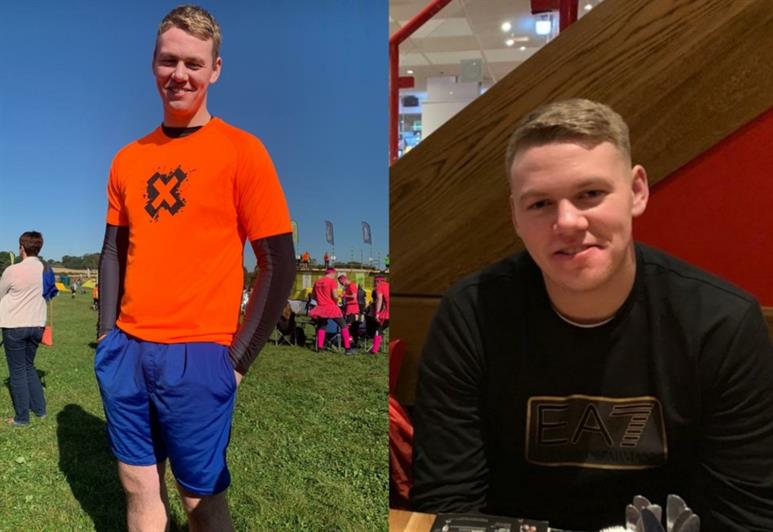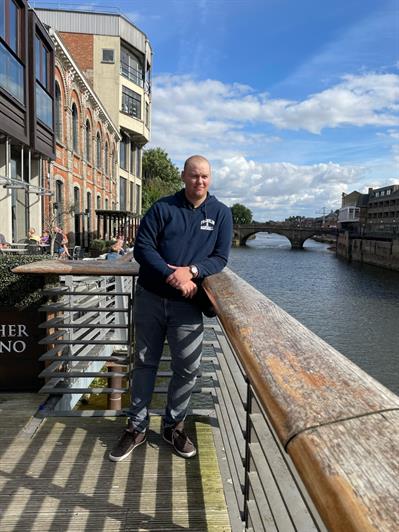
Image: (left to right) Harry at a sporting event, and Harry out for dinner. Credit: Janine Williams.
I’m sharing my story – Harry’s story – because I want to raise awareness of sarcoma, and because I don’t want anyone to go through what Harry is going through.
Harry is my son. He’s now 21. When he was 19, he was diagnosed with stage 4 sarcoma.
In December 2019, he went to see a doctor about a lump on his left rib, which was the size of an egg. He had an x-ray, but was told there was ‘no apparent defect’, and so it was probably dislocated cartilage, caused by play-fighting.
We were warned that the lump was going to swell and get larger and painful, but that there was nothing nasty to worry about.
So Harry got on with life. What else does a 19-year-old do? The doctor said to come back in a month if there were concerns, but the lump stayed the same, so we trusted that it was just a dislocation.
The lump then suddenly grew, massively. Within a couple of months, it had gone from being the size of an egg to the size of a grapefruit.
'Hearing the word 'cancer''
We got it checked out, and Harry was referred for a CT scan. This was in April 2020.
The day after the scan, Harry got a call at work. He came home that night in tears, and said he couldn't remember anything the doctor had told him, as he hadn’t been able to concentrate past hearing the word 'cancer'.
For a 19-year-old to receive that call at work and then drive himself an hour home. I’ll never be able to understand what was going through his head during those 60 minutes.
What the scan had showed was that, as well as the huge lump on his chest, Harry also had lumps in his lungs and water on his lungs.
Although the doctor had said cancer, the diagnosis still wasn’t confirmed, so we didn’t know what exactly we were facing.
I won’t go into the details of the following weeks, but there were a series of delays and cancellations. By the time Harry had a biopsy and got the results back, his chest cavity had filled with fluid, and his lung had collapsed.
The results showed the tumour had grown to 17cm, Harry’s heart had been displaced, and there was cancer in the lining of his left lung.
The diagnosis was confirmed as advanced Ewing sarcoma, a type of cancer that’s found in soft tissue or bones. For Harry, the cancer was in his bones.
'The treatments worked to an extent'
Harry’s chest was drained, and then he started on chemotherapy. He had 14 rounds. This started in May, during the height of Covid-19, so Harry had to go to all his appointments alone. He spent his 20th birthday in hospital alone receiving chemotherapy.
Seven weeks of radiotherapy then followed. The treatments worked to an extent – they shrunk the cancer. But it was still inoperable. To fully remove it, surgeons would have had to remove the lining of his ribs, his lungs and his heart, and it was too risky.
In November 2020, we were told there was nothing else that could be done.
We entered a state of limbo. Harry was going for regular MRIs, but we didn’t know what would happen if the cancer progressed.
And that’s still where we are now. Harry’s been going for his scans, and we’ve been stumbling along, trying to carry on as before.
I say stumbling, but Harry’s coped fantastically. He’s been so positive throughout. If anything, he’s helped me through the whole thing.
Everyone talked about the ‘new normal’ during Covid. Now we have our own version of that too.
For Harry, normal life no longer involves work. He had to give up his apprenticeship after he was diagnosed, and I know he’d love to be working now, but he suffers from a lot of fatigue so it’s just not possible.
His new normal also means he can’t exercise in the same way he used to. He was such a keep-fit fanatic, and he loved going to the gym with friends, but it’s not the same anymore. He has built back up to be able to run 10 minutes on a treadmill though, which has been great to see.

Image: Harry, as he is now, stood by the river. Credit: Janine Williams.
Cancer is completely and deeply and utterly unfair. It always is.
I think Harry’s been dealt a worse hand than most, but he’s doing okay at the moment. In April this year, they found multiple lumps in his lungs, but we found out last week that they were a result of Covid, which he had at Christmas.
The last few months have been really scary. We thought the cancer was back, and it was awful having to wait for the x-ray results.
The ICR, together with The Royal Marsden, has established the Joint Sarcoma Research Centre – one of the largest sarcoma research centres in Europe. Sarcoma research has lagged behind other cancers for decades, and our aim is to accelerate research to help transform the lives of sarcoma patients sooner.
The Joint Sarcoma Research Centre
‘Part of living with cancer is waiting’
But part of living with cancer is waiting: waiting for results, waiting for a diagnosis, waiting, and hoping, for new treatment options.
While we wait, we’re going to keep on living as normal a life as we can. Harry’s only 21, and there’s so much out there for him to enjoy.
I want us to keep on living, and I want to raise awareness of Harry’s story. Even if it only helps one person, it’s still worth telling it.
We had no idea what sarcoma was until it happened to us. You know your own body better than anyone, so if something doesn’t seem right, or you have any concerns, please go to the doctor and don’t be afraid to keep on pushing until you get the help you need.
Harry wanted to go to Vegas for his 21st birthday, but obviously Covid put a stop to that. At the end of this month, he turns 22. I don’t know what we’ll do to celebrate yet – we’d held off planning anything until he got his x-ray results back – but whatever it is, I’m just happy he’ll get to enjoy spending time with his family and friends.
People with cancers of unmet need, like sarcoma, urgently require new treatment options to help them survive their disease. Improving the outlook for these patients is one of our key fundraising priorities.
Cancers of unmet need
comments powered by